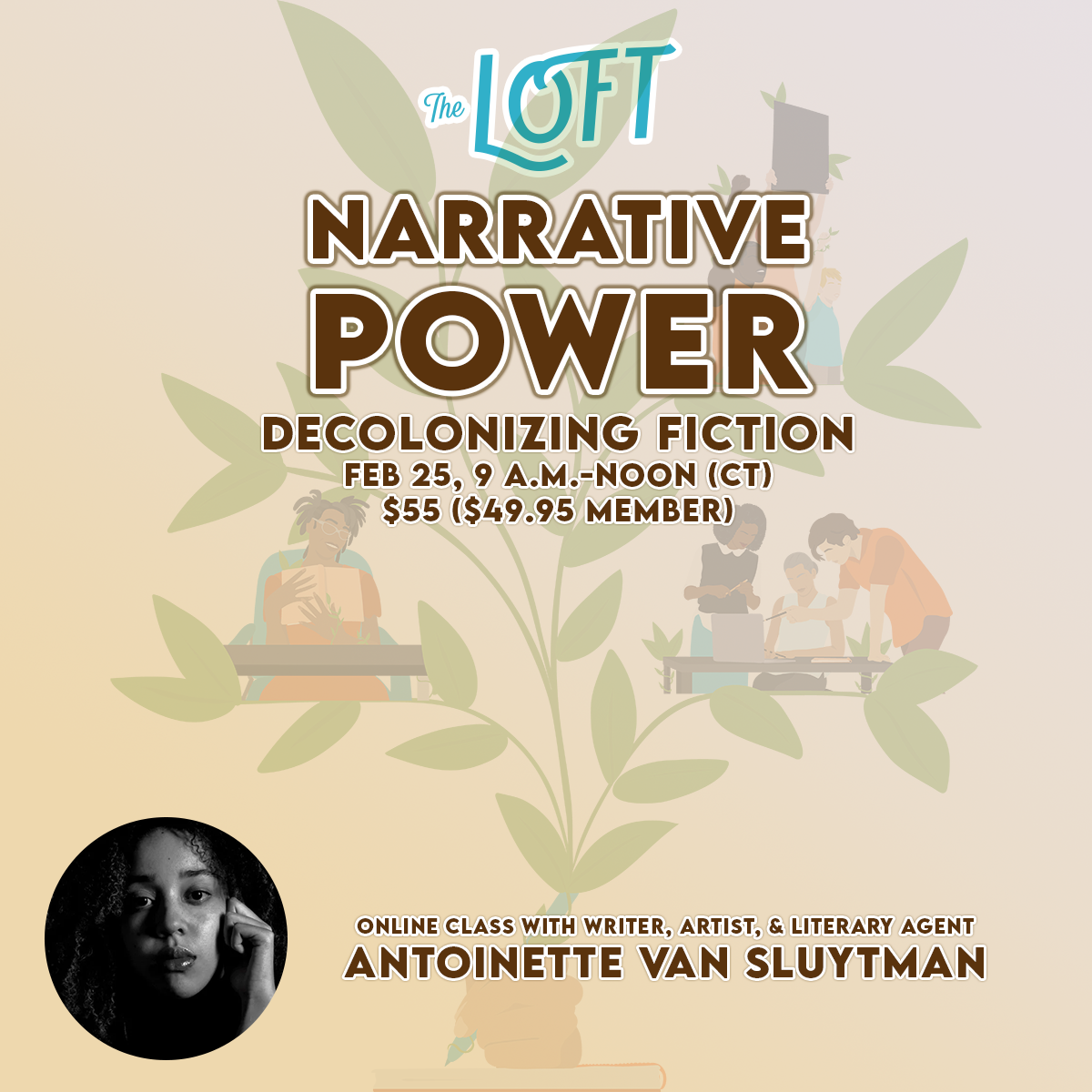Breaking Convention and Deconstructing the Paradigm

As part of the year-long Narrative Power theme, Antoinette Van Sluytman will teach an online class on February 25 titled Decolonizing Fiction. In the interview below, we asked her a bit about her upcoming offering.
1. Tell us a little bit about yourself and what brought you to teach this class
As a writer, literary agent, graphic designer, student of Africana history, and illustrator I typically describe myself as a creative who fashions many hats. The core of each of these passions is a fervent love for storytelling and creativity, which inspires almost everything I do. This love for storytelling is what caused my path as a writer and entrepreneur to inevitably intersect with the world of agenting, and thus offered a step forward into the publishing industry. I learned many things as an assistant, but even before my internship I was aware of the many issues within the industry and the rather abysmal gaps that existed for creatives like me, which motivated me to be an advocate for new voices and diverse stories. The lack of non-white industry professionals at decision-making tables at agencies and publishers, being one example.
For a long time I was exposed to the many nuanced conversations regarding diversity in books and publishing, but after months of reading manuscripts and furthering research into the subject, I noticed there was an underlying issue layered beneath these conversations that was faintly acknowledged, if acknowledged at all. It was this idea that ‘diversity’ begins and ends with influence and skin complexion. There were few conversations being had on the effects of literary imperialism or the westernized pedagogy that makes up our creative writing workshops which has even influenced diaspora writers. I realized then that ‘diversity’ could apply to the very structure of writing craft, and yet stories marketed as hallmarks of diversity are still expected to conform to the hegemony of western literary structures normalized by white men. This conformity is slowly fed to writers from literary agents, english teachers, editors and creative writing workshops, existing at the very crux of our literary spaces.
Writers are taught foremost that success pends on knowing how to write the right way. Writers are not taught to question where the idea of what classifies as right came from, and this goes for industry professionals as well. From there I realized that this subject related to post-colonialism and I began studying more about the psychological effects of colonization and how it applied to creative writing. The more I learned, the more it became clear to me that this was something more industry professionals and writers should be aware of. Furthermore, for me the best way of pursuing such an initiative was to begin where it all started. The classroom.
2. The Loft is spending the year exploring the theme of Narrative Power, or as Toni Cade Bambara put it, "The job of the writer is to make the revolution irresistible." What does "revolution" mean to you in this context and how does your class fit this theme?
The subject of my class is to upend the very idea that there is only one correct way to write stories. White founded institutions have attempted to define what diversity really means, and continue to do so for writing craft. My goal for this class is to deconstruct our mindsets and analyze writing craft as a way of freeing ourselves from being conditioned by literary imperialism established by those like Gustav Freytag and John Yorke. Culture is not a monolith, and since craft is inseparable from identity, neither is storytelling. In the context of Toni Cade, we are lifting the veil of conformity and opening our eyes to writing structures beyond the monomythic paradigm. What does revolution mean for this class? A great author once said “the master’s tools will never dismantle the master’s house”. Revolution, as it applies to the Decolonizing Fiction course, is an initiative to bring more tools to the table so we can build our own houses.
3. Your class description specifically mentions four writers: Frantz Fanon, Rebecca Roanhorse, Ken Liu, and Matthew Salesses. What is it about their work that speaks to you and to your class topic?
The first name recommended to me during my studies into this subject was Matthew Salesses and his book Craft in the Real World. This was one of the few books that offered an in-depth analysis about everything I was trying to bring awareness to, focused primarily on the fiction writing workshops and how craft should be taught. Frantz Fanon’s Wretched of the Earth is without a doubt an incredible examination of post-colonialism and its psychological implications. Considering how these implications subconsciously affect the very way we see ourselves and the world around us, it was easy connecting his analysis to writing craft and how we perceive storytelling. Writers like Roanhorse and Liu are authors who I believe integrate anticolonial themes into their work, broaching diversity beyond complexion and inspiration in a commendable way.
4. The class also speaks to sci-fi/fantasy/speculative work, what is it about these genres that invites this kind of exploration? Would someone who has never written in those genres, but who is interested in the topic, still get something out of your class?
I believe SFF can be a tool of cultural reclamation for those affected by colonialism as well as a cathartic lens for writers of the diaspora. It is a lens through which genre can be redefined and tradition can be explored in compelling and imaginative ways, which has been the case for many non-white writers. We see this beginning with those who explore Afrofuturism and Silkpunk. For those not familiar with speculative fiction, I always encourage writers not to limit themselves within the genre they write because learning from different genres can actually strengthen writing craft. There is much a horror writer can learn from reading science fiction and plenty a fantasy writer can learn from practicing poetry. The goal of this course is to deconstruct the core of writing craft by deconstructing our mindsets, and therefore, the only thing truly required from students is an open mind.
